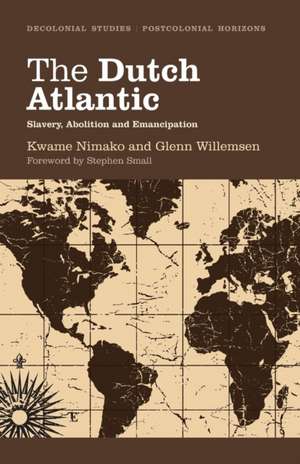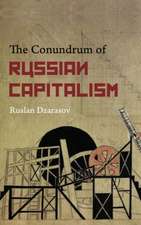The Dutch Atlantic: Slavery, Abolition and Emancipation
Autor Kwame Nimako, Glenn Willemsenen Limba Engleză Paperback – 11 sep 2011
Kwame Nimako and Glenn Willemsen show how the slave trade and slavery intertwined economic, social and cultural elements, including nation-state formation in the Netherlands and across Europe. They explore the mobilisation of European populations in the implementation of policies that facilitated Atlantic slavery and examine how European countries created and expanded laws that perpetuated colonisation.
Addressing key themes such as the incorporation of the formerly enslaved into post-slavery states and contemporary collective efforts to forget and/or remember slavery and its legacy in the Netherlands, this is an essential text for students of European history and postcolonial studies.
| Toate formatele și edițiile | Preț | Express |
|---|---|---|
| Paperback (1) | 253.88 lei 6-8 săpt. | |
| PLUTO PRESS – 11 sep 2011 | 253.88 lei 6-8 săpt. | |
| Hardback (1) | 646.19 lei 6-8 săpt. | |
| PLUTO PRESS – 11 sep 2011 | 646.19 lei 6-8 săpt. |
Preț: 253.88 lei
Nou
Puncte Express: 381
Preț estimativ în valută:
48.59€ • 50.12$ • 41.12£
48.59€ • 50.12$ • 41.12£
Carte tipărită la comandă
Livrare economică 04-18 martie
Preluare comenzi: 021 569.72.76
Specificații
ISBN-13: 9780745331072
ISBN-10: 0745331076
Pagini: 240
Ilustrații: black & white tables
Dimensiuni: 135 x 215 x 15 mm
Greutate: 0.3 kg
Editura: PLUTO PRESS
Colecția Pluto Press
ISBN-10: 0745331076
Pagini: 240
Ilustrații: black & white tables
Dimensiuni: 135 x 215 x 15 mm
Greutate: 0.3 kg
Editura: PLUTO PRESS
Colecția Pluto Press
Notă biografică
Kwame Nimako teaches International Relations at the Graduate School of Social Sciences, University of Amsterdam. He is the author and co-author of over 30 books, reports and guidebooks on economic development, ethnic relations, social policy, urban renewal and migration.
Glenn Willemsen (1948-2008) was the first director of the National Institute for the Study of Dutch Slavery and its Legacy (NiNsee) from 2003 to 2008. He was also Adjunct Professor at the Union Institute & University, Cincinnati, Ohio from 1999 to 2008.
Glenn Willemsen (1948-2008) was the first director of the National Institute for the Study of Dutch Slavery and its Legacy (NiNsee) from 2003 to 2008. He was also Adjunct Professor at the Union Institute & University, Cincinnati, Ohio from 1999 to 2008.
Cuprins
Acknowledgements
Foreword
Stephen Small, UC Berkeley
Preface
Artwell Cain, NiNsee
1 Introduction, Goals and Issues
Introduction and Goals
Context and Concepts
Importance and Relevance
Overview of Chapters
2 Transatlantic Slavery and the Rise of the European
World Order
The Age of Banditry (1492–1648)
Sovereignty and Chattel Slavery (1648–1789)
Citizenship, Slavery and the ‘Free Soil Ideology’
Science and Chattel Slavery
3 Chattel Slavery, Sugar and Salt
Slavery and the Making of Global Economy
Slavery and Sugar
Sugar and Suriname
Pacification and Resistance
4 Abolition without Emancipation
European and Systemic Context
From Regulation to Intervention
Modalities of Abolition: Progressive Control versus
Transformative Change
Abolition and Citizenship
5 Trajectories of Emancipation: Religion, Class,
Gender and Race
Religion and Emancipation
Class and Emancipation
viii The Dutch Atlantic
Gender and Emancipation
Race and Emancipation
The Immediate Aftermath of Abolition
6 The Legacy of Slavery: The Unfinished Business of
Emancipation
Memory and Dignitarianism
Commemorators and Commemoration
Integration and Multiculturalism
NiNsee as a Contested Project
Museums and Galleries
Reparations
Anniversaries and Apologies
7 Conclusion: Parallel Histories and Intertwined
Belonging
Some Conclusions
A Final Note
Bibliography
Index
Foreword
Stephen Small, UC Berkeley
Preface
Artwell Cain, NiNsee
1 Introduction, Goals and Issues
Introduction and Goals
Context and Concepts
Importance and Relevance
Overview of Chapters
2 Transatlantic Slavery and the Rise of the European
World Order
The Age of Banditry (1492–1648)
Sovereignty and Chattel Slavery (1648–1789)
Citizenship, Slavery and the ‘Free Soil Ideology’
Science and Chattel Slavery
3 Chattel Slavery, Sugar and Salt
Slavery and the Making of Global Economy
Slavery and Sugar
Sugar and Suriname
Pacification and Resistance
4 Abolition without Emancipation
European and Systemic Context
From Regulation to Intervention
Modalities of Abolition: Progressive Control versus
Transformative Change
Abolition and Citizenship
5 Trajectories of Emancipation: Religion, Class,
Gender and Race
Religion and Emancipation
Class and Emancipation
viii The Dutch Atlantic
Gender and Emancipation
Race and Emancipation
The Immediate Aftermath of Abolition
6 The Legacy of Slavery: The Unfinished Business of
Emancipation
Memory and Dignitarianism
Commemorators and Commemoration
Integration and Multiculturalism
NiNsee as a Contested Project
Museums and Galleries
Reparations
Anniversaries and Apologies
7 Conclusion: Parallel Histories and Intertwined
Belonging
Some Conclusions
A Final Note
Bibliography
Index












